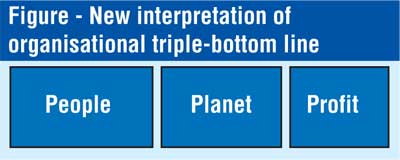Tuesday Feb 17, 2026
Tuesday Feb 17, 2026
Friday, 15 December 2017 09:07 - - {{hitsCtrl.values.hits}}
By Dhinesha Ruwanthi Perera
In the backdrop of Triple Bottom line (People-Planet-Profit), organisations are traversing towards a spirituality culture. Workplace spirituality is interpreted as employees having an inner life that sustains and is sustained by meaningful work in the context of society (Poole, 2009). While spirituality is an evolving buzz-word, there is still little research done on workplace spirituality and its holding-power in post-modern organisations and business enterprises (Robbins et al., 2013). Organisational behaviour in the 21st century has carved a new dimension of employee emotions that is expressed in different, but meaningful ways.
 Spirituality is an empathy-driven approach being adopted by employees for several purposeful reasons. The stressful paces of life can be reasonably counterbalanced by spirituality, employees move to question the meaning of work against the backdrop of progressive job demands and studies envisage that material acquisitions (money, reputation and prestige) leave employees unfulfilled. Therefore there is a rationale for the growing interest towards workplace spirituality.
Spirituality is an empathy-driven approach being adopted by employees for several purposeful reasons. The stressful paces of life can be reasonably counterbalanced by spirituality, employees move to question the meaning of work against the backdrop of progressive job demands and studies envisage that material acquisitions (money, reputation and prestige) leave employees unfulfilled. Therefore there is a rationale for the growing interest towards workplace spirituality.
Values, ethics, motivation, sustainability and leadership of individuals in organisations encompass spiritual leadership. Despite preliminary studies on workplace spirituality in Sri Lanka, there are cultural characteristics inherent to spiritual organisations. Benevolence, trust and respect, open-mindedness and strong sense of purpose are the identified organisational culture aspects. Work ethics is the holistic study of “business situations, activities and decisions where the issues of right and wrong are addressed” (Crane &Matten, 2010).
Spirituality is the social role of businesses intertwining the interests of both society and stakeholders. Benevolence is the expression of kindness towards employees and all stakeholders including wider society having interest in the organisation. Carroll &Buchholtz (2009, p. 44) emphasised that corporate social responsibility (CSR) means the “economic, legal, ethical and philanthropic expectations and desires placed upon businesses by the society at a given point in time”. There is a reasonable certainty that CSR is inter-related to workplace spirituality and they are positively correlated.
Trust and respect are twin-elements which differentiate spiritual organisations. Mutual trust, honesty and integrity of employees are underpinned by dignity, esteem and value for employees by the organisation. Flexible thinking and creative-space for employees is valued by workplace spirituality known as open-mindedness.
Strong sense of purpose reveals that profit is not the primary value for evolving business organisations. People and planet, the two other aspects of triple bottom line is of equal concern and catalyses the business performance in a balanced manner. Hence, most organisations are moving from secular interests driven by profits; towards interests precipitated on employee feelings and sympathy towards people and environment (green-practices). The vertical garden concept is being practiced by organisations which contribute towards ecological greenery and home-grown vegetation. This is a strategic move to minimise environmental pollution and long-term food crises.
McDonalds Corporation has initiated “Pass on the Happiness”, a spirituality drive by both employees and customers. Employees and customers are encouraged to regard how their work and spending respectively embraces a sense of purpose. While achieving a spiritual workplace, the stakeholders buy an ice-cream cone and donates another 80 S$ to Ronald McDonald House Charities (Nov 2017-McDonalds SG). This is a true sense of calling by a multinational organisation to stakeholders and to be sensitive towards dire needs of society. As the season of giving-Christmas unfolds it is pertinent for businesses to consciously regard the ethical duties and work ethics towards societal needs both visible and emergent.
In the backdrop of criticism, the question arises whether organisational profits and spirituality are compatible objectives. Thus business managers and investors should regard the paradigm shift of the traditional triple bottom line and its augmented emphasis on people and planet in modern business contexts. Secular institutions which are traditional-oriented focus primarily profits protecting secular interests. However, the evolving business entities and employees should reflect on people and planet which are spirituality-driven. This approach could engrave a spiritual workplace strategy as well. The paradox still remains – whether workplace spirituality is synonymous with CSR?
The writer is a lawyer by profession and a lecturer as well. She is also a researcher and published her work in the fields of organizational ethics, organizational behaviour, legal aspects of supplies for businesses and workplace spirituality. She could be contacted via email [email protected]